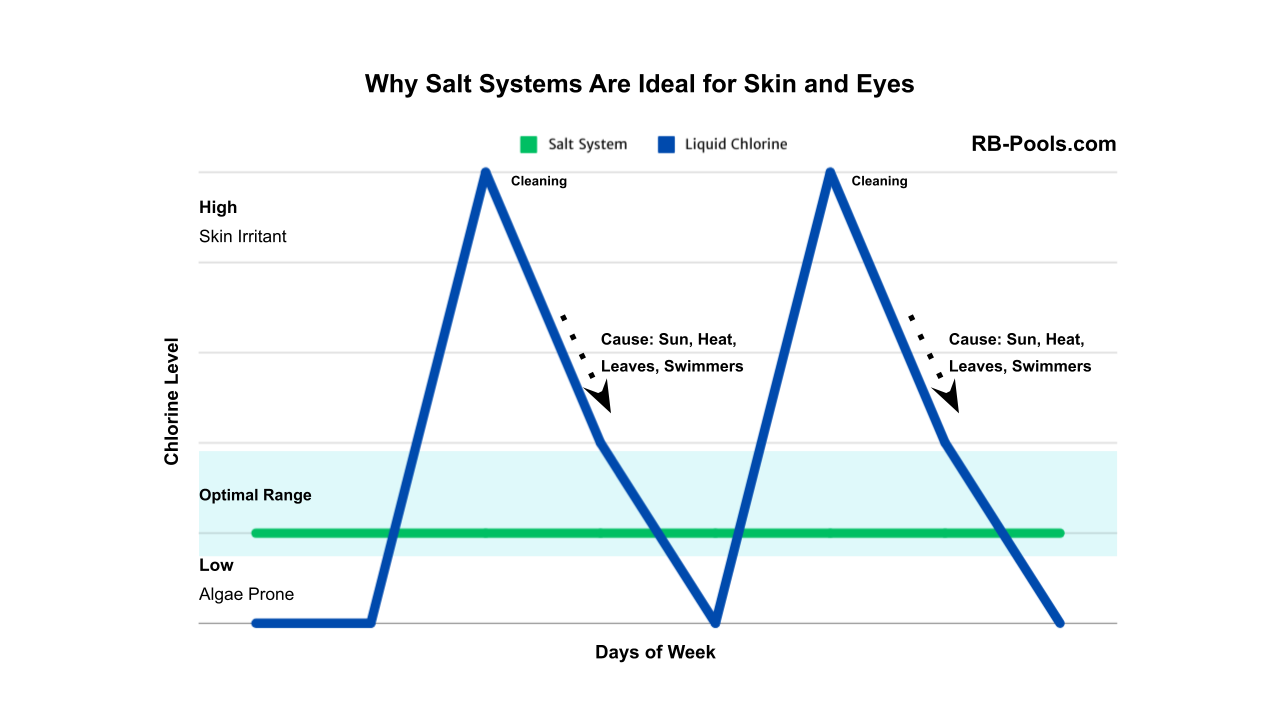The Benefits of Saltwater Pools: A Smart Choice for Comfort and Sustainability
Swimming pools are a fantastic addition to any home, offering relaxation, exercise, and entertainment. Traditional chlorine pools have been the standard, but savvy homeowners are making the switch to saltwater pools.
While both options have their pros and cons, saltwater pools offer unique benefits that improve comfort, health, and maintenance. In this guide, we’ll explore how salt systems work and the advantages of saltwater pools. This will help you decide if upgrading to a salt system is the right choice for you and your family.
How Salt Systems Work
Saltwater pools use a chlorine generator that breaks apart salt (NaCl) into chlorine (Cl) and sodium (Na). When this happens, chlorine is naturally created in your pool. Salt systems control the amount of chlorine that is produced, ensuring a constant level of chlorine in your pool. This is in contrast to liquid chlorine pools, which require high levels of chlorine to be added to prevent algae from growing between servicing.
With a salt system, we can maintain your pool’s water health with lower levels of chlorine, which has many benefits:
1. Gentler on Skin and Eyes
One of the most common complaints about chlorine pools is the irritation they cause to the skin and eyes. Liquid chlorine can dry out your skin and leave it feeling itchy. It can also cause redness and discomfort in your eyes.
Saltwater pools, on the other hand, enable your pool to maintain lower chlorine levels that are much gentler on a swimmer's skin and eyes.
2. Lower Maintenance Requirements
Maintaining a chlorine pool requires regular addition of chlorine and acid, and sometimes even shocking the pool to keep the water clean and clear.
Saltwater systems maintain chlorine levels, which in turn help balance pH levels, requiring less acid to be used. While you’ll still need to check and adjust pH levels, the overall maintenance effort is lower compared to traditional pools.
3. Eco-Friendly and Sustainable
Did you know that the majority of chlorine is produced in the Midwest, Canada, and China? This means chlorine is shipped worldwide to be used in Southern California pools.
Chlorine pools require frequent additions of harsh chemicals, which can have a negative impact on the environment. When backwashing or draining pool water, excess chlorine can find its way into local waterways, potentially harming the local habitat.
Saltwater pools use a more natural approach to sanitation. The continuous conversion of salt into chlorine reduces the need for transporting chemicals across the country and around the world, making it a more eco-friendly choice. Plus, saltwater pools generally have fewer chemical byproducts, resulting in cleaner and safer water.
4. More Enjoyable Swimming Experience
Have you ever noticed how your skin feels softer after swimming in the ocean as compared to swimming in a pool? That’s because saltwater is naturally soothing.
While saltwater pools don’t have the same salinity as ocean water, they still provide a much smoother, silkier swimming experience compared to traditional chlorine pools.
5. Reduced Risk of Allergic Reactions
Some people are highly sensitive to chlorine, experiencing allergic reactions such as rashes, respiratory issues, and sinus irritation. Saltwater pools are a great alternative for those who struggle with chlorine sensitivity, as they create a milder, less chemically intensive swimming environment.
6. Great for Families and Frequent Swimmers
If you have children who use the pool frequently, the benefits of a saltwater system become even more evident. Kids won’t experience the same level of skin and eye irritation as they would in a traditional chlorine pool. Additionally, frequent swimmers will appreciate the smoother, more natural feel of the water.
Things to Consider Before Switching to a Saltwater Pool
While saltwater pools offer numerous benefits, they’re not without some considerations. Here are a few things to keep in mind before making the switch:
Upfront Cost: Installing a saltwater system can be more expensive than a traditional chlorine pool setup. There is the cost of the salt generator and the salt that needs to be added to your pool. Costs can range from $1,000–$2,500 for the system, plus $150–$300 for salt.
Seasonal: Salt systems generate chlorine when water temperatures are over 65 degrees. This means that they work well March - November in Coachella Valley. During the winter months, salt systems don’t work unless you heat your pool.
Salt Corrosion: Some pool components, such as metal railings and certain types of stone decking, may be more prone to corrosion in a saltwater environment. Choosing salt-resistant materials can help prevent damage.
Electricity Usage: The salt chlorine generator uses electricity, but this shouldn’t have a noticeable impact on your power bill, as modern systems are designed to be energy-efficient.
Copper Plumbing: Salt can be corrosive to certain types of metal fixtures. Let us inspect your pool plumbing to determine if your pool can support a salt system.
Is a Saltwater Pool Right for You?
If you’re looking for a pool system that provides the most enjoyable swimming experience, lower maintenance, and long-term cost savings, a saltwater pool is an excellent option. While there are some upfront costs and considerations, the benefits—especially for those with sensitive skin or allergies—make it a worthwhile investment.
At RB Pools, we specialize in designing, installing, and maintaining high-quality saltwater pools. Whether you’re considering a new pool or looking to convert an existing one, our team can guide you through the process to ensure you make the best choice for your home and lifestyle.
Ready to make the switch? Contact RB Pools today at (760) 397-5141 to learn more about saltwater pool installation and maintenance!


